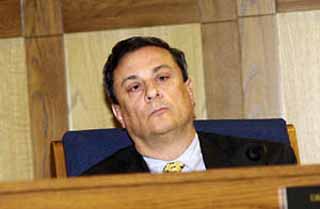Winter Heat Wave at ACC
The heat is on Austin Community College President Richard Fonté.
By Cathy Vaughan, Fri., March 8, 2002

"Believe me, I can take the heat," Austin Community College President Richard Fonté assured the crowd at a meeting of the school's Board of Trustees on Monday, March 4. It's a good thing, too -- because there was plenty of heat to go around that night, as students, faculty, and staff stood up to criticize Fonté and the board for the "official ineptitude" (in the words of one speaker) they say has brought the school to its present financial problems.
Yet in the end, the board decided it would chill with Fonté at least a little longer -- approving his proposals for a one-time summer application fee increase of $30 and the issuance of $10.5 million in new bonds to refinance the institution's debt. But it remains to be seen if those measures will be enough to stave off ACC's growing budget crisis.
In the last month, Fonté has announced not one but two budget shortfalls: a $3.3 million deficit for the 2001 fiscal year, and a projected $2.1 million for FY02. He followed those announcements with a series of measures designed to tighten ACC's belt, in the hopes of balancing its books. Fonté's initial moves -- a tuition increase and the cancellation of nearly 300 spring and summer classes -- met with strong opposition. Students say they are being forced to pay for administrative mismanagement. Many are also angry that the cancellations will force them to rearrange their schedules, in some cases interfering with their degree plans.
The backstory is even uglier than a $3.3 million shortfall. To hear many ACC people tell it, the school's present financial troubles are just part of a long and sordid history of incompetence on the part of the school's administration. Students and faculty in this camp -- and it's a big camp -- heap most of the blame on Fonté himself. Complaints against the chief executive date back almost to the first days of his presidency, and the charges against him are numerous and varied. The current list of grievances charged to Fonté includes: the deficit, the class cuts, and the handling of a reduced tuition program, a litany of payroll problems, the loss of student records, the handling of unusual and potentially toxic mercury levels detected at the Rio Grande campus in January, his impulsive nature, his lack of interpersonal skills, and his unwillingness to listen. In September of 2000, the faculty senate voted no confidence in Fonté, as did the faculty union, and both organizations reaffirmed those resolutions after the shortfall was announced. The union also recently passed a measure calling for the president's resignation.
Fonté argues that the budget shortfall isn't his fault, explaining it as the result of an uncomfortable coupling of soaring enrollment with stagnating funds. And though he regards the no confidence vote as "sad," he has promised to work collaboratively with all members of the ACC community to pull the college out of this jam.
The board of trustees has responded to the community's display of discontent by rallying around the president, though for apparently mixed reasons. Chair Lillian Davis believes Fonté has been a "good president," and board member Beverly Silas unequivocally affirms her "confidence in President Fonté," but others are willing to admit he's made a few mistakes. John Worley, for example, says "a lot of criticism is in order, and a lot of changes need to be made." The way Worley sees it, however, too much change might endanger the school's stability. (On Monday, Worley joined Beverly Watts Davis and Allen Kaplan in dissenting from Fonté's financial proposals.)
On one issue, virtually everyone at ACC agrees: The school is woefully underfunded for the job it is trying to do. Indeed, the school's tax rate has not changed since voters first approved it in 1986, and at 5 cents on $100 of property value it is the lowest in the state. (The average rate in Texas is 15 cents per $100.) Yet ACC has continued to expand with Austin, and expects to serve more than 75,000 students this year. Currently, students are paying for this expansion by way of tuition and fees -- among the highest in the state -- but tuition increases are a bitter pill for an institution that prides itself on accessibility. Sooner or later, something has to give. Nearly everyone at ACC thinks a property tax increase is overdue.
What's less certain, of course, is how to get it. Worley fears that replacing Fonté now would jeopardize ACC's chances of winning a tax increase when they put the question to the voters in May 2003. He says the time it would take for the board to find and hire a new candidate, and for that candidate to become acclimated to the college, would make it "very difficult for a new president to lead an effort to increase the tax rate."
Those who have called for Fonté's resignation loudly disagree. Many have even threatened that they will refuse to support a tax increase under the current administration. At Monday's meeting, Cypress campus history professor Sean Murray said, "One might as well believe in perpetual motion and pixies as expect the taxpayers to come to our rescue." And though Fonté has suggested that the best way for the college to woo the voters would be to "show them that we are doing our best with the resources available to us," Daniel Traverso -- an arts professor at the Northridge campus -- thinks the only way to secure the tax increase might be to "wipe the slate clean."
To that end, faculty and students are considering potential candidates to fill the three spots opening up on the board in the May city election. Even those who don't call for Fonté's resignation say that a more student/faculty-friendly board could provide more guidance and oversight to the administration and help to repair the school's tarnished image. That project may take a good deal more work than even balancing the budget.
Got something to say on the subject? Send a letter to the editor.








